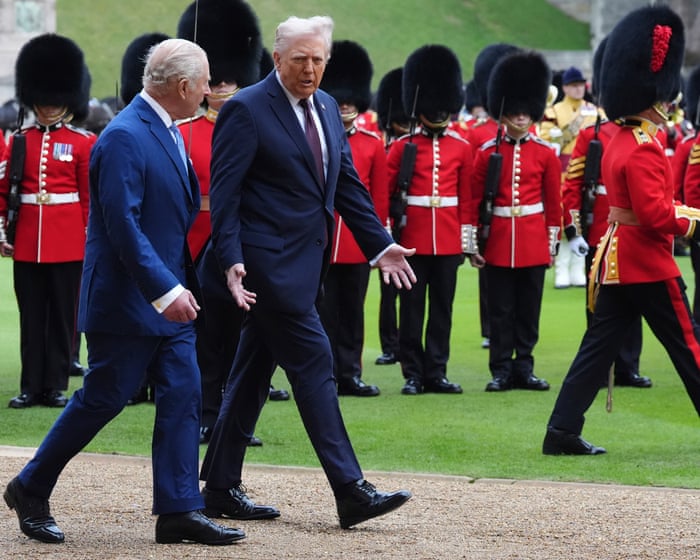As Donald Trump met with a smiling Keir Starmer and senior royals during his UK state visit this week, I found myself wishing for a Daily Mail body language expert. Did Starmer’s hand wave hint that he wanted to ask about the migrants currently detained in Florida, surrounded by alligators? Did King Charles’s lip shape suggest he was thinking about the women who have accused Trump of sexual assault?
But perhaps it’s best not to dwell on it. That seemed to be the theme of the visit. While protesters lined the streets, the British delegation turned a blind eye and pulled out all the stops: a gilded carriage, a military ceremony, and Foreign Secretary Yvette Cooper offering an enthusiastic head tilt that made it look like she was signaling she was being held hostage.
At times, it felt like we were all extras in a worse version of Love Actually, where the liberal fantasy of Hugh Grant standing up to the villainous US president never happens (though at least no one kept going on about Martine McCutcheon’s thighs).
There are practical reasons for courting Trump. Maintaining the special relationship has been credited with shielding the UK from steep tariffs, and the timing of this visit reportedly coincides with a £150 billion investment from US firms. Yet the fact that Trump’s schedule avoided London—sidestepping larger protests—and conveniently took place while Parliament was in recess does suggest that, deep down, none of this feels right.
Whether it’s the horror in Gaza or the rise of cruel anti-migrant policies, the pretense that our current reality is normal is truly maddening. Or to put it another way: you know a diplomatic trip is off when it starts with an image of the guest of honor standing next to a convicted child sex trafficker projected onto Windsor Castle.
Trump’s unprecedented second state visit is essentially realpolitik gaslighting, where we’re told a man threatening to take control of the US capital’s police force deserves the red carpet treatment (and a flyover by the Red Arrows).
That Trump is here just days after what’s thought to be the largest nationalist gathering in Britain in decades makes the unease even more palpable. It’s hard not to feel like a disease is being allowed to spread, as far-right demonstrators march over Westminster Bridge and a US president—who this week celebrated the firing of a late-night TV host for a critical joke—receives the largest guard of honor ever for a state visit.
The pomp and ceremony lavished on Trump is a glaring example of how, on both sides of the Atlantic, we’ve grown accustomed to accepting the unacceptable. In the US, the late Christian nationalist Charlie Kirk is sanctified, while here, an MP describes “the vast majority” of a crowd listening to great replacement theory as “good, ordinary, decent people.” (Spoiler: it was Nigel Farage.)
This crisis is made worse by the sense that our elected leaders are utterly unprepared to handle the scale of the challenge—or are even fueling it themselves. Over the weekend, there was a remarkable period when it was unclear if the prime minister would even address the march, as if Keir Starmer had gone to a football match and forgotten to turn his phone back on. Eventually, after 24 hours, Downing Street released a statement saying the government would not tolerate people being “intimidated on our streets because of their background or the colour of their skin.” For context, that response was slower than the band James’s.
Five days after Elon Musk called for Parliament to be dissolved, the government is still using X for official announcements. “We are a fair, tolerant, and decent…”We are in the fight of our times, Starmer tweeted on Tuesday, without specifically mentioning the far right. It reminds me of how it might have felt to see the Gunpowder Plot foiled—if James I had been posting about it on Guy Fawkes’s social media.
As of now, opposition leader Kemi Badenoch has not tweeted about the 110,000 people who attended a march organized by Tommy Robinson, nor has she commented when asked by the media. She has, however, made time to promote her new LBC show.
I can’t help but look back fondly on the 2010 general election, when Gordon Brown called a voter a “bigot” for complaining about “all these eastern Europeans coming in.” I’m not suggesting Starmer should start insulting the public or presidents—at least not on a live mic—but I do wonder: when will our leaders call a racist a racist? And what does it say about our political culture that they seem so afraid to?
This week, it was largely left to Sadiq Khan—one of Britain’s few senior Muslim figures and a frequent target of Islamophobic threats—to call out Trump for fueling “the flames of divisive, far-right politics around the world.” That contrast between dereliction of duty and bravery speaks volumes.
By Friday morning, Trump will have left British soil. But the crisis he represents will remain. Hate and division can’t be sent away on Air Force One. It takes difficult conversations and courageous action to address them. Whether Starmer and his colleagues are up to the task is the real question. One thing is certain: to solve a threat, you must first name it.
Frances Ryan is a Guardian columnist.
Frequently Asked Questions
Of course Here is a list of FAQs based on the provided statement
BeginnerLevel Questions
1 What does roll out the red carpet mean in this context
It means giving a visiting foreign leader in this case Donald Trump an extremely grand formal and hospitable welcome similar to how a royal or a very important person would be treated
2 What is the main point of this statement
The main point is that while the UK might host a lavish visit for Trump the underlying political and economic problems the country faces will still be there after he leaves and will need to be dealt with
3 What kind of crisis is the UK in
This typically refers to ongoing challenges such as the economic and political uncertainties following Brexit costofliving pressures or divisions within the country and its government
4 Why would the UK give Trump this kind of treatment
Countries often give special treatment to leaders of powerful allied nations to strengthen diplomatic ties discuss trade deals and show mutual respect on the world stage
IntermediateLevel Questions
5 Is there a strategic benefit to treating a US President this way
Yes A strong relationship with the US president can lead to favorable trade agreements intelligence sharing and support on global issues which are all valuable to the UK especially postBrexit
6 What are the potential downsides of this approach
It can be seen as hypocritical if the government is criticizing the leaders policies at home while honoring them abroad It can also be unpopular with the public if that leader is a divisive figure
7 Could this royal treatment actually help solve the UKs crises
It might help in specific areas like negotiating a trade deal with the US but it is not a solution to deeprooted domestic issues like public services inflation or political unity which require internal policy changes
8 Has this kind of situation happened before with other leaders
Yes diplomacy often involves welcoming leaders with grand ceremonies regardless of political disagreements For example many countries rolled out the red carpet for controversial leaders in the past to maintain important international relationships
AdvancedLevel Questions
9 How does this statement critique shorttermism in politics
It suggests that governments might focus on the shortterm spectacle and photoops of a highprofile visit to



